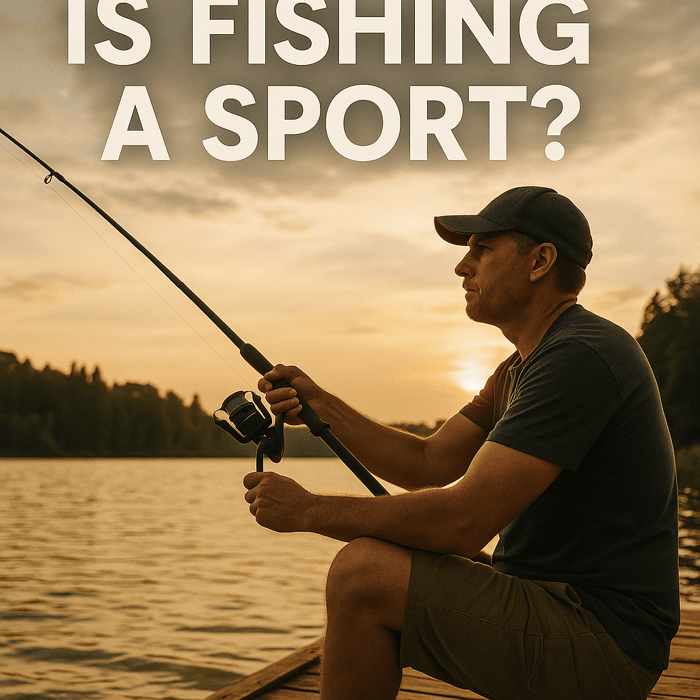Fishing is one of those things that ignites never-ending arguments among fans, critics, and onlookers. Some regard it as an exhilarating challenge of ability and stamina, while others consider it a soothing means of passing a day on the water. The question at the center of this debate—is fishing a sport—has polarized opinions for decades. To put this argument to rest, we must look deeply at what constitutes a sport, how fishing holds up, and why it's such a divisive issue. In this 3,000-word examination, we'll touch on all sides, from the physical and mental strain of fishing to its competitive scene and cultural weight. By the time you finish, you'll have a good idea of whether is fishing a sport can say a firm "yes" or whether we'd be better off leaving it as a hobby.
What Makes a Sport? Defining the Criteria
Before we can give an answer to is fishing a sport, we must define what constitutes a sport. Typically, a sport requires physical effort, ability, rivalry, and rules or standards. Consider sports such as soccer, tennis, or swimming—these obviously fit the bill. But fishing? It's not so clear. Some say it's too passive, others that it's not because of its challenges and competitive structures. Let's examine the major elements of a sport and how fishing holds up.
Physical Exertion: Does Fishing Require Sufficient Effort?
One of the initial arguments against fishing as a sport is that it doesn't appear to be physically demanding. Critics tend to envision a person sitting by a lake, rod in hand, waiting for a fish to bite. But this is an oversimplification. Fishing can be a physical activity, depending on the variety. Deep-sea fishing, for instance, entails fighting huge fish such as marlin or tuna, which can weigh hundreds of pounds and take hours to bring in. Fly fishing involves making precise, repetitive casting motions that exercise the arms and shoulders. Even freshwater fishing typically involves standing for hours, walking to out-of-the-way places, or paddling a boat. When we ask whether fishing is a sport, the exercise itself provides a compelling argument for "yes."
Skill and Strategy: The Art of Fishing
A sport is not merely about physical exertion—it's about skill and control. Fishing is no game of chance. Fishermen must understand fish behavior, water conditions, and the most effective bait or lures to use. They must master casting techniques, from the subtle motion of a fly rod to the forceful toss of a surf rod. Strategy is paramount in competitive environments, such as bass fishing tournaments. Fishermen must determine where to fish, when to switch tactics, and how to outmaneuver competitors. The question is fishing a sport becomes more valid when you take into account the skill and practice involved in becoming proficient.
Competition: Fishing in the Arena
Competition is the cornerstone of most sports, and fishing has its own competitive side. From regional fishing derbies to cash-rich professional competitions such as the Bassmaster Classic, competitors vie for prizes, titles, and visibility. These competitions are accompanied by strict regulation—consider catch limits, time limits, and gear restrictions—so they are as formalized as any sport. The fact that there are organized events is a strong argument for answering is fishing a sport with reference to sporting status.
Rules and Structure: The Framework of Fishing
Sports are based on rules to maintain fairness, and fishing is no different. In tournaments, fishermen have regulations on everything from how large fish they can retain to what bait they can use. Even recreational fishing usually adheres to local regulations, such as catch-and-release regulations or seasonal bans. This regulated framework brings fishing in line with other sports, supporting the contention that is fishing a sport isn't merely a loose question but one based on organized activity.
The Case for Sport Fishing
Based on the requirements outlined, let's construct the argument for making fishing a sport. Physical exertion, skill, competition, and organization constitute a strong foundation, but more can be revealed.
The Physical Aspect of Sport Fishing
Fishing can constitute a whole-body exercise, particularly in some formats. Surf fishing, for example, entails wading in breaking waves, casting heavy rods, and reeling in fish against heavy currents. Ice fishing entails drilling holes through solid ice, pulling heavy equipment, and standing in freezing cold. Even bass fishing, commonly regarded as less demanding, entails hours of casting, boat handling, and rapid hook-setting reflexes. When arguing over whether fishing is a sport, the physicality of these activities is difficult to ignore.
The Mental Struggle of Fishing
Sports are not only about the physical body—they challenge the mind as well. Fishing requires patience, concentration, and troubleshooting. Anglers need to read the water, decipher weather patterns, and cope with volatile fish behavior. Under tournament conditions, the stakes are even higher, with the competitor against the clock making split-second decisions. This mental resilience is one reason why is fishing a sport appeals to those who view it as something beyond a pastime.
Fishing's Competitive Environment
Competitive fishing has grown in popularity, and shows like the FLW Tour and Major League Fishing have massive viewing audiences. Professional fisherman, like Kevin VanDam or Jacob Wheeler, are sports heroes, complete with endorsements and fans. Tournaments sometimes have gigantic cash payouts—over $100,000 sometimes—showing that fishing does not have to be a low-risk activity. The competitive aspect of fishing is a solid basis of the argument that is fishing a sport.
Accessibility as a Strength
One of the singular strengths of fishing is how accessible it is. Anyone of any age, level of fitness, or background can do it. From children casting off a pier to older adults entering local tournaments, fishing has something for everyone. And that accessibility does not take away from its sport status; instead, it follows the same pattern of sports such as golf or bowling, which emphasize skill over sheer athleticism. Looking at is fishing a sport, its general appeal only helps the argument.
The Case Against Fishing as a Sport
Not everyone agrees that fishing is a sport. To gain a complete understanding of the debate surrounding is fishing a sport, we must discuss the opposing side and address the criticisms.
Is Fishing Too Leisurely?
One of the strongest arguments against fishing as a sport is its leisurely pace. Most individuals fish to get away from the stress of everyday life, appreciating the peacefulness of nature. In contrast to high-speed sports such as basketball or hockey, fishing typically consists of extended periods of waiting. Critics say that this laid-back atmosphere does not compare to the competitiveness of mainstream sports. When inquiring whether fishing is a sport, this image of fishing as a peaceful activity is a strong counterargument.
Not Always Competitive
Another criticism is that fishing is not necessarily competitive. Although there are tournaments, most anglers fish for relaxation, food, or enjoyment, not to defeat an adversary. Critics argue that a sport must always be competitive, such as in wrestling or track. This brings up the question: is fishing a sport only in its competitive manifestations, or does the recreational aspect undermine its sporting classification?
Minimal Athletic Requirements
The accessibility of fishing, though a plus, can be a negative within this argument. In contrast to sports that require the pinnacle of physical health, fishing can be accomplished with very little effort—consider a person sitting in a chair with a rod holder. This lack of athleticism, detractors say, makes fishing unique among "true" sports. When considering is fishing a sport, this stance questions its position among more physically demanding activities.
Perception vs. Reality
Public opinion comes into play as well. Fishing is stereotyped as a low-key activity for weekend warriors or retirees, not a serious sport. This perception, fostered in popular culture, makes it more difficult for some to believe that is fishing a sport on par with football or swimming.
Fishing in the Modern Era: A Sport on the Rise
In spite of the doubts, fishing is making progress as an accepted sport. New technology, media coverage, and structured events are changing the way people perceive fishing. Let's examine how these elements are responding to is fishing a sport in innovative ways.
Technology's Role in Fishin
Present-day fishing is no longer primitive. Sophisticated equipment, such as sonar fish finders, GPS guidance, and sophisticated rods, has taken the sport to a different level. Drones are employed to survey bodies of water, and apps track weather patterns. These technologies impose layers of technique and strategy on the sport, making it dynamic. The tech revolution makes the argument that is fishing a modern sport.
Fishing in the Media Spotlight
Fishing tournaments are televised now, with events such as the Bassmaster Classic garnering millions of viewers. TV shows such as "Wicked Tuna" and "River Monsters" promote the drama and thrill of fishing, presenting it as a high-stakes sport. This media attention is changing attitudes, so it is simpler to make the case that is fishing a mainstream sport.
Youth and Community Engagement
Fishing is also drawing younger anglers with programs such as college scholarships and high school fishing leagues. Community activities, including family fishing days and charity tournaments, are also gaining popularity. These activities emphasize the position of fishing as a sport that creates relationships, further affirming the response to is fishing a sport.
Global Reach of Fishing Competitions
Fishing is not only a local hobby—it's an international phenomenon. Competitions in nations such as Japan, Australia, and Brazil attract global participants and spectators. The internationalization of fishing competitions lends credence to the argument that is fishing a sport with a global following.
Comparing Fishing to Other Sports
To better understand is fishing a sport, let's compare it to other sports long argued about in the sporting world. Comparisons give insight into fishing's status within the larger athletic world.
Fishing vs. Golf: A Similar Debate
Fishing and golf have much in common. Both are games that demand precision, patience, and technical proficiency, and both can be played or played competitively. Golf is recognized globally as a sport, with professional tours and Olympic competition. If golf is a sport, why then is fishing not a sport? The similarities create a powerful argument that it is fishing a sport too.
Fishing vs. Archery: Precision and Focus
Archery, similarly to fishing, is a sport of accuracy and targeting. Both require mental concentration and technical knowledge, and both have competitive elements. Archery's status as an Olympic event provides precedent for sports such as fishing. If arguing about whether fishing is a sport, then archery as a sport reinforces the argument about fishing.
Fishing vs. Esports: A Modern Perspective
Esports, or competitive video gaming, is a relatively new sport that emphasizes mental ability over physical activity. If esports as a sport can be accepted, then fishing with its combination of physical and mental challenges certainly has a case to be considered. This analogy assists in answering is fishing a sport in a manner consistent with changing definitions of sports.
Fishing vs. Hunting: Outdoor Pursuits
Hunting, similar to fishing, is a traditional outdoor activity. Although hunting is not generally a sport, shooting sports are considered competitive. Fishing's competitive modes, such as tournaments, reflect these shooting competitions, lending evidence to the theory that is fishing a sport in organized environments.
The Cultural Significance of Fishing
Fishing is not merely an activity—fishing is a cultural force. From ancient tradition to contemporary media, fishing has influenced communities and guided an endless array of stories. This cultural resonance enriches the query is fishing a sport.
Fishing in History and Tradition
Fishing has been a way of life for decades, right from indigenous tribes to coastal towns. Though initially it was a survival means, it grew to be a leisure activity and a competitive one. All this history makes sense to the belief that is fishing a sport with strong origins.
Fishing in Pop Culture
Fishing is well represented in the media, ranging from old books such as "The Old Man and the Sea" to contemporary television programs such as "Deadliest Catch." The drama and art of fishing are portrayed by these exhibitions, presenting it as a sporting activity. Cultural attention provides a positive response to is fishing a sport.
Fishing Communities and Events
Anglers unite in close-knit groups with clubs, websites, and events such as fishing expos. Large events, such as ICAST or the Big Rock Blue Marlin Tournament, are a celebration of the sport of fishing. These collective undertakings reinforce that is fishing a sport with a devoted following.
Debunking Myths About Fishing
To address is fishing a sport in full, we have to overcome prevalent myths obscuring the argument.
Myth 1: Fishing Is Purely Luck-Based
Although luck does come into play, fishing is more about technique. Seasoned anglers will always beat amateurs because they have knowledge of fish behavior, tackle, and weather. Debunking this myth further supports the argument that is fishing a sport.
Myth 2: Fishing Requires No Athleticism
As we’ve seen, fishing can be physically demanding. From battling big fish to trekking through rugged terrain, anglers often face athletic challenges. This counters the argument against is fishing a sport based on physicality.
Myth 3: Fishing Lacks Structure
Competitive fishing is very much regulated, with regulations covering anything from catch limits to ethical behaviors. Even recreational fishing has to obey local statutes, providing a planned framework. This planning helps reinforce the concept that is fishing a sport.
Myth 4: Fishing Is Only for Relaxation
Although fishing can be calming, it's also rigorous in competitive or demanding environments. The duality of fishing—relaxing for one, competitive for another—doesn't disqualify it as a sport. This subtlety serves to further explain is fishing a sport.
The Future of Fishing as a Sport
In the future, fishing is set to expand as a sport. With growing participation, technological innovation, and international appeal, the question is fishing a sport might soon have a resounding yes.
Growing Participation Rates
Fishing is hot, particularly among youths. Activities such as youth fishing leagues and college teams are cultivating future anglers. This growth indicates that is fishing a sport with a promising future.
Sustainability and Ethics
Conservation-minded anglers are today's norm, with catch-and-release and habitat restoration gains in popularity. This ethical orientation brings fishing into line with other sports that focus on responsibility, further supporting the argument that is fishing a sport.
Technological Advancements
Technologies such as intelligent lures, underwater cameras, and artificial intelligence-based fish finders are elevating fishing to a more high-tech level. These technologies raise the skill and strategy factor, affirming that is fishing indeed a sport in a high-tech age.
Global Expansion and Recognition
Fishing tournaments are becoming international, with tournaments taking place in Asia, Europe, and South America. As fishing gains international prestige, its role as a sport will be confirmed, answering the question is fishing a sport on an international stage.
Conclusion: So, Is Fishing a Sport?
With this in-depth dive, the answer to the question is fishing a sport is definite: yes, it is. Fishing requires physical effort, mental tactics, and intense competition, fulfilling the fundamental requisites of a sport. Its popularity, cultural importance, and increasing popularization only add more ammunition to its cause. Though some might continue to view fishing as a recreational activity, the emergence of professional competitions, sophisticated technology, and die-hard enthusiasts attests that it's far more. Whether you’re casting a line for fun or chasing a tournament trophy, fishing offers a unique blend of challenge and excitement that earns it a rightful place in the world of sports.





